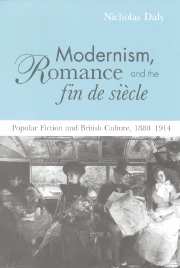Book contents
- Frontmatter
- Contents
- Acknowledgements
- Introduction
- 1 Incorporated bodies: Dracula and professionalism
- 2 The imperial treasure hunt: The Snake's Pass and the limits of romance
- 3 ‘Mummie is become merchandise’: the mummy story as commodity theory
- 4 Across the great divide: modernism, popular fiction and the primitive
- Afterword: the long goodbye
- Notes
- Index
Introduction
Published online by Cambridge University Press: 23 November 2009
- Frontmatter
- Contents
- Acknowledgements
- Introduction
- 1 Incorporated bodies: Dracula and professionalism
- 2 The imperial treasure hunt: The Snake's Pass and the limits of romance
- 3 ‘Mummie is become merchandise’: the mummy story as commodity theory
- 4 Across the great divide: modernism, popular fiction and the primitive
- Afterword: the long goodbye
- Notes
- Index
Summary
We begin with a play and a party. In December 1899 The Ghost, a play by Henry James, Robert Barr, George Gissing, H. Rider Haggard, Joseph Conrad, H. B. Marriott-Watson, H. G. Wells, Edwin Pugh, A. E. W. Mason and Stephen Crane, had its first and last performance in a village schoolhouse in Sussex. Besides the eponymous ghost, the dramatis personae seem uncannily familiar, including as they do a Dr Moreau, a Peter Quint and, with a nod to Gilbert and Sullivan, ‘Three Little Maids from Rye’. To mark the arrival of the new century, Crane had invited a large party, including some of the authors of The Ghost, and other well-known men of letters, to spend Christmas and New Year's Eve with him and his wife at Brede Place, near Rye, a partly modernized medieval manor house. In his Experiment in Autobiography (1934), H. G. Wells tries to evoke the spirit of the occasion:
I remember very vividly a marvellous Christmas Party in which Jane and I participated. We were urged to come over and, in a postscript, to bring any bedding and blankets we could spare … We were given a room over the main gateway in which there was a portcullis and an owl's nest, but at least we got a room. […]
- Type
- Chapter
- Information
- Modernism, Romance and the Fin de SièclePopular Fiction and British Culture, pp. 1 - 29Publisher: Cambridge University PressPrint publication year: 2000



